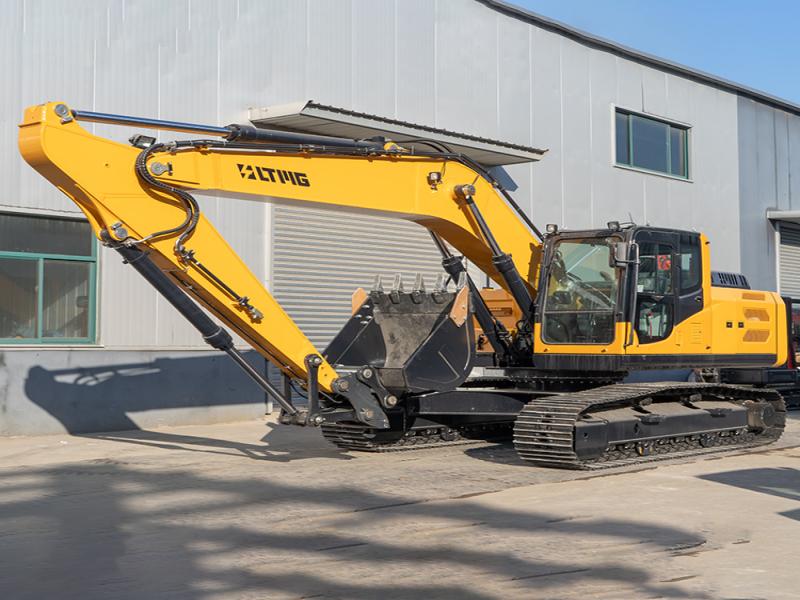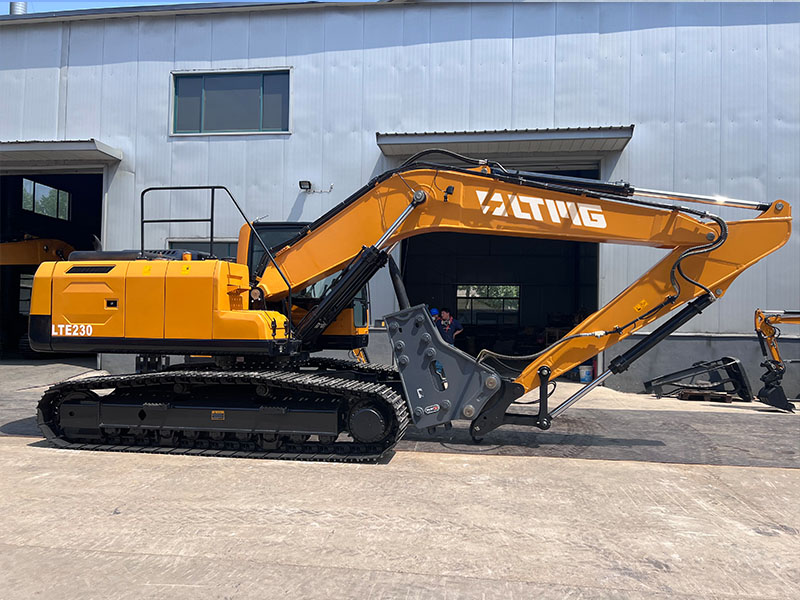How To Add Hydraulic Fluid To Excavator?
Apr 23, 2024
The process of adding hydraulic fluid to an excavator involves several steps and precautions to ensure proper operation of the hydraulic system and prolong the life of the machinery. The following is a detailed adding process:
1. Select the appropriate hydraulic oil:
First, you need to select the appropriate hydraulic oil according to the working conditions of the excavator and the specific requirements of the hydraulic system. The selection of hydraulic fluid should take into account its key role in transferring energy, lubrication, sealing, and cooling. Different hydraulic components used in hydraulic oil have a minimum configuration requirement, so in the selection should pay attention to the type of hydraulic parts and their use of materials, seals coatings or paints, and other compatibility with the hydraulic oil.
2. The use of an automatic oiler:
To prevent dirt and water into the hydraulic system and lubrication system, resulting in performance degradation, you can consider the use of an automatic oiler. Automatic oiler through the height adjustment pump drive, easy to operate, can reduce the labor intensity of workers.
3. Filtration and purification:
Before adding hydraulic oil, advanced filtration, and purification methods should be used to remove contaminants in the hydraulic oil to ensure the cleanliness of the hydraulic system, thereby extending the life of the machinery. The design of the hydraulic tank should also include oil absorption filter elements and oil return filter elements, as well as oil absorption elbow to further ensure the cleanliness of the hydraulic oil.
4. Replacement of hydraulic oil filter:
The traditional excavator to replace the hydraulic oil method is to pump out the hydraulic oil tank hydraulic oil and replace the hydraulic oil filter, and then fill it with new hydraulic oil. This method is simple, but can only replace about 48% of the hydraulic oil in the system, the remaining dirty oil will be mixed with the new hydraulic oil, reducing the service life of the hydraulic pump and other components.
5. Maintenance and repair:
In the course of use, the hydraulic oil should be regularly checked and maintained to ensure that its performance meets the requirements. This includes monitoring changes in the quality of hydraulic oil and timely replacement of aged or deteriorated hydraulic oil.
6. Control oil cleanliness:
through contaminant control, residue reduction, and proper oil filter selection, you can ensure that the hydraulic system's oil cleanliness, reduces the probability of failure.
7. Consideration of environmental factors:
As construction machinery is usually used for outdoor operations, environmental temperature changes, and complex working conditions, so in the selection and use of hydraulic oil, should pay special attention to the impact of these environmental factors.
In short, the digger adds hydraulic oil is a need to consider a variety of factors in the process. By choosing the right hydraulic oil, using an automatic oiler, filtering, and purifying, correctly replacing the cartridge, regular maintenance and repair, as well as considering the impact of environmental factors, you can effectively ensure the normal operation of the excavator's hydraulic system and extend the life of the machinery.
How To Choose The Right Hydraulic Oil According To Different Types Of Excavators?
Choosing the right hydraulic fluid is crucial for the normal operation and prolonged service life of construction machinery such as excavators. We can summarize some key points to guide how to choose the right hydraulic fluid for different types of excavators.
Understanding the classification and selection method of hydraulic fluid is the foundation. Hydraulic fluids are categorized according to their application, oil properties, and quality level. This means that when selecting a hydraulic fluid, the first thing you need to consider is the excavator's working environment and operating conditions, such as whether it is working in harsh conditions, which will have a direct impact on the requirements for the viscosity and oxidation resistance of the hydraulic fluid.
The selection of hydraulic fluid should also take into account the matching problem with the engine and hydraulic pump. Proper matching ensures efficient operation of the entire system, including load adaptability and high transmission efficiency across the entire engine speed range. Therefore, when selecting a hydraulic fluid, it is important to consider not only the needs of the hydraulic system itself but also the matching of the entire powertrain.
In addition, the quality of the hydraulic fluid is also one of the factors that must be considered when selecting. Under the harsh conditions of construction machinery operations, it becomes particularly important to make simple judgments about the quality of the hydraulic fluid. This includes but is not limited to, the viscosity of the hydraulic fluid, oxidation resistance, and other requirements. The correct hydraulic fluid not only protects the equipment from wear and tear but also improves efficiency and extends the life of the equipment.
The principles and requirements for proper hydraulic fluid selection should not be overlooked.39 This includes consideration of the viscosity, oxidation resistance, and filtration properties of the hydraulic fluid. Especially in the face of complex geological conditions or in a specific working environment, it is particularly important to choose the right hydraulic oil.
Selecting the right hydraulic fluid for different types of excavators requires comprehensive consideration of the classification of the hydraulic fluid, its matching with the power system, its quality, as well as the selection principles and requirements. By carefully analyzing the working environment and conditions of the excavator, combined with the relevant characteristics and standards of the hydraulic oil, a more reasonable choice can be made.
What Is The Application And Effect Of An Automatic Oiler In An Excavator Hydraulic System?
The application and effect of automatic oilers in excavator hydraulic systems show significant advantages, mainly reflected in the following aspects:
1. Improve work efficiency and reduce work intensity: the automatic refueling system can automatically replenish or change oil according to the operating conditions of the excavator, which not only reduces the work intensity of manual refueling but also improves work efficiency. This highly automated system avoids secondary pollution and ensures the quality of hydraulic oil.
2. Strong anti-pollution ability: the design of the automatic refueling system takes into account the cleanliness of the hydraulic oil, through the way of filtering refueling, effectively preventing the contamination of the hydraulic oil. This is important for prolonging the service life of machinery and reducing the failure rate.
3. Save time and improve refueling efficiency: especially in the need for frequent refueling occasions, such as flood control hydraulic crawler excavator, an automatic refueling device can significantly save refueling time and improve refueling efficiency. This is especially important for the rapid response to emergencies.
4. Real-time monitoring of the state of the hydraulic oil: through the integration of oil sensors and other technologies, the viscosity, moisture, cleanliness, temperature, and level of the hydraulic oil can be monitored in real-time. This real-time monitoring capability helps to detect potential problems in the hydraulic system promptly so that measures can be taken in advance to avoid failure.
5. Adapt to the maintenance and reliability of harsh environmental conditions: In harsh environmental conditions, such as coal mines, the automatic refueling system can ensure the cleanliness of the hydraulic fluid and reduce the failure caused by pollution, thus improving the maintenance and reliability of construction equipment.
6. The application of a centralized fluid supply system: the application of an oil centralized filling system in construction machinery demonstrates the characteristics and advantages of a centralized fluid supply system, which can achieve more efficient and economical hydraulic oil management for large construction machinery such as excavators.
The application of automatic oilers in excavator hydraulic systems has brought significant benefits, including improved work efficiency, reduced work intensity, enhanced anti-pollution capabilities, time savings, improved refueling efficiency, real-time monitoring of hydraulic fluid status, and adaptation to maintenance and reliability under harsh environmental conditions. These advantages make the automatic oiler an indispensable part of the excavator hydraulic system.
What Are The Filtration And Purification Methods For Excavator Hydraulic Oil And How Effective Are They?
Excavator hydraulic oil filtration and purification methods mainly include the following, and their effects are different:
1. Three-stage cartridge filtration system:
This system through the design of a three-stage cartridge filter and pipeline filtration system, the use of quick-change couplings will be connected to the filtration system and the hydraulic oil tank of the construction machinery, to meet the needs of high-volume construction machinery hydraulic oil filtration operations. This method can effectively reduce the pollution level of hydraulic oil, which is better than the industry standard.
2. High-precision cartridge filtration technology:
This technology usually refers to the size of the particles that can be filtered out below 3μm pollutants of the oil filter, the cartridge properties are mainly mesh, paper, sintered, steel wire and magnetic and other forms of filtration accuracy of up to 1μm. this method can effectively remove small particles of pollutants in the hydraulic oil, and improve the cleanliness of the hydraulic system.
3. Electric heating + multi-stage filtration + oil and gas separation:
First through the electric heating system to heat the oil temperature to 60 ° C, and then sequentially primary filtration (using a new type of high-gradient electromagnetic cartridge in parallel to filter the oil ferromagnetic corrosion products and oxidation of macromolecules), intermediate filtration (to remove large solid particles), three-stage filtration (using a high filtration accuracy of the ordinary parallel filter cartridge to form a redundancy), and finally by the An exhaust valve removes gaseous impurities from the oil and air bubbles generated during the filtration process, and removes water from the oil through an oil-water separation system. In addition, the oil cleanliness level is monitored in real-time by a pollution particle counter, and the solenoid valve of the oil return pipe is closed when the purification level requirement is reached.
4. Centrifugal separator:
A hydraulic oil purifier is designed, which consists of a pretreatment oil circuit and a centrifugal separator, and can gradually and effectively remove water, air, and solid particles from the hydraulic oil, to ensure the good operation of hydraulic machinery.
5. Hydraulic tank cleanliness control:
Through the hydraulic tank manufacturing process improvement, including tank structure and manufacturing process improvement, as well as the development of new tank pre-treatment, drying, and dust-free assembly methods, you can effectively avoid the adverse effects of solid particles on the service life of the hydraulic system to achieve the purpose of improving the cleanliness of the hydraulic system.
Each of these methods has its characteristics, but the common goal is to reduce the contaminants in the hydraulic fluid through various technical means to ensure the normal operation of the hydraulic system and extend its service life. Each method has its unique advantages and applicable scenarios, and choosing the right filtration and purification method is crucial to improving the performance and reliability of the excavator hydraulic system.
What Are The Best Practices For Replacing Excavator Hydraulic Oil Filter Elements?
Best practices for replacing excavator hydraulic oil cartridges involve several aspects, including hydraulic system oil change methods and procedures, hydraulic tank design, hydraulic filter selection and use, and the proper selection of hydraulic filters. The following is a detailed analysis based on the information I searched for:
1. Hydraulic system oil change methods and steps: first of all, you need to understand the excavator hydraulic system oil change methods and steps, which is the key to avoiding system contamination. The oil change process should pay attention to matters including ensuring the quality of the new oil, the use of the correct tools and techniques for the operation, as well as after the oil change to carry out appropriate checks to ensure that the system operates normally.
2. Hydraulic Tank Design: The design of the hydraulic tank is critical to preventing air bubble problems and cartridge dislodgement. Therefore, when replacing the filter element, the return filter structure of the hydraulic tank should be considered to ensure that it can effectively filter the impurities in the fluid, thereby reducing the occurrence of failures.
3. Hydraulic filter selection and use: The reasonable selection and use of hydraulic filters to ensure the normal operation of the excavator hydraulic system is an important part. Should be based on the actual application of construction machinery needs, choosing the most appropriate hydraulic filter specifications, to give full play to its functional role.
4. Reasonable choice of hydraulic filter: in the hydraulic system, the choice of oil filter should follow the general principles and methods. This includes consideration of the specific working conditions of the system, the expected working life, and the required filtration accuracy and other factors. Reasonable oil filter selection can significantly improve the stability and reliability of the system.
5. Hydraulic oil filter selection: in the design and improvement of hydraulic systems, how to rationally select and effectively use the oil filter is an important discussion point. This involves an in-depth understanding of the performance of the oil filter, including its filtration efficiency, durability, and compatibility with other components of the system.
Best practices for replacing hydraulic oil filter elements in excavators should include the following key steps: first, understand in detail and follow the hydraulic system's oil change methods and procedures; second, consider the characteristics of the hydraulic tank design to ensure that the filter element can work efficiently; third, reasonably select hydraulic filters based on actual application needs; and finally, reasonably select and use filters based on the hydraulic system's operating conditions and requirements. Through these steps, you can ensure the efficient and stable operation of the excavator hydraulic system.
How To Adjust The Maintenance And Repair Strategy Of The Excavator Hydraulic System According To Environmental Factors?
The first thing to consider when adjusting the maintenance and repair strategy of an excavator hydraulic system according to environmental factors is the special requirements in a high-altitude environment. At high altitudes, due to the lower air pressure, the ambient temperature is also relatively low, which directly affects the working efficiency and reliability of the excavator hydraulic system. To adapt to this environment, it is necessary to match the power of the engine and the main pump and adjust the air volume and static pressure of the fan and radiator. In addition, it is also necessary to take measures to pressurize the hydraulic oil tank, adjust the speed and displacement to prevent the main pump from sucking empty, and adjust the hydraulic oil viscosity level in time according to the ambient temperature at high altitudes to protect the hydraulic components and reduce the starting torque.
Considering the energy consumption of the excavator under different working conditions, the potential energy loss of the movable arm in the descending process can be recovered and used for its next ascending action, which can effectively reduce the energy loss and improve energy utilization efficiency. This method not only helps to save energy but also extends the service life of the equipment and reduces maintenance costs.
In terms of maintenance strategy, a more scientific and reasonable maintenance plan can be developed for key components such as hydraulic cylinders based on reliability analysis and failure mode and effect analysis (FMEA). By collecting historical failure data and utilizing statistical tools and parameter estimation methods, reliability parameters are determined so that appropriate maintenance policies and countermeasures can be formulated for new hydraulic cylinders.
In addition, controlling the degree of contamination of the hydraulic system is also a part of maintenance that cannot be ignored. Studies have shown that a significant portion of the hydraulic system failure is due to improper use of hydraulic oil, and a large portion of these failures is due to foreign matter mixed in the oil. Therefore, controlling the generation of pollutants, reducing residual pollutants and the correct selection and rational use of oil filters is the key link to control the degree of pollution.
Adjusting the maintenance and repair strategy of the excavator hydraulic system according to environmental factors requires comprehensive consideration of the special requirements of a high-altitude environment, improvement of energy utilization efficiency, maintenance strategy development based on reliability analysis, and effective control of contamination and other aspects. Through scientific and reasonable design and maintenance measures, the performance and reliability of the excavator hydraulic system can be significantly improved, the service life of the equipment can be extended, and maintenance costs can be reduced.


